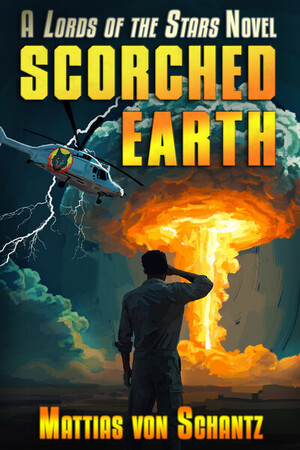Chapter 4:
Darkness and Light
Fleeting Andire
he voice sliced through the stillness, a thread of human sound in this forsaken landscape. My head whipped around, heart pounding, seeking its source. Through the haze of dread, my eyes settled on a building—ancient, crumbling, its stone walls choked with vines and grass, as if the green had claimed it thousands of years ago. Windows gaped like hollow eyes, their frames warped by time, and greenery spilled from every crack, a living shroud over decay. The sight chilled me, yet a flicker of light pierced the dark interior, a faint beam reaching toward me like a beckoning finger.
I glanced back. The black figures loomed still, distant but relentless, their crooked forms cutting through the mist. Their slow advance sent a shiver up my spine, an unspoken threat hanging heavy. Turning to the building again, the light pulsed, a silent call that stirred something deep within—caution, yes, but also a desperate need to escape. Who—or what—had spoken? The figures were alien, their intent unclear, while the voice, at least, sounded human. In this unknown place, where trust was a luxury I couldn’t afford, I chose the lesser evil. Better to face a voice than those shadows.
My boots crunched on the broken road, jagged concrete and twisted vines snagging my steps. I leapt over a collapsed beam, thorns tearing at my jeans, the locket bouncing against my chest. The building loomed closer, its air thick with the scent of rot and earth. Every sense sharpened, expecting an ambush—hands to seize me, teeth to rend. The light dimmed as I crossed the threshold, plunging me into darkness. The walls, slick with moss, seemed to pulse, and the floor creaked underfoot, a graveyard of forgotten wood.
A voice echoed again, “Here!”—closer now, urgent. Another burst of light flared, blinding me for a heartbeat before settling into a soft, hovering wisp, its glow casting eerie shadows. In its dim illumination, a figure emerged—a small person, no more than three feet tall, with a curly beard swallowing most of his face. His large, magenta eyes glinted like gemstones, unnerving in their intensity. I stumbled back, my foot slipping on the damp floor, a jolt of fear spiking through me. This wasn’t human—not entirely.
Before I could speak, he began, his voice old and strange. “Methinks thou hast not seen mine kind afore, hast thou? Verily, a surprise it be to find thee so startled.” His gaze flicked to the wisp, now drifting lazily, and I realized its sudden calm mirrored his presence. My mind reeled—how had that burst turned to this? I stood frozen, unsure whether to flee or question.
He snapped to attention, his tone sharpening. “Aside, get thee, young one!” He hopped onto a rock, peering out a shattered window. His expression—concern, I thought—creased his bearded face as he murmured, “The crooked ones, too puissant they grow, alas.” A sigh escaped him, and he raised a gloved hand, cream fabric catching the light. A dark blue glow erupted, the air sucking inward with a hollow whoosh. Then, as the glow vanished, silence fell, absolute and oppressive.
He leapt down, and I flinched as his small hand gripped mine. Another glow pulsed, and a weight lifted from my shoulders—fear, exhaustion, the shadow of the figures—replaced by a still calmness. Shocked, I stared at him. He met my gaze with mild annoyance and pride. “Worry thee not, lad,” he said. “No more shall the dark beings follow. Look not out yon window at them, I counsel. Careful thou be, yet mine interference ends here. Thine own agenda brought thee hither, methinks, and meddle I shall not. Yet heed this warning—tread warily.”
He turned, moving into the building’s depths, intent on leaving me. Panic surged. “Wait!” I called. “Take me with you!” He paused, not turning. After a moment, he spoke, “Follow closely, if cherish thou dost, for decide I cannot what others choose.” The wisp glided to him, and I stumbled forward. “Thank you,” I said, voice shaky. He waved a hand dismissively. “Gratitude I seek not. The code of mine master I followed, naught else. Cared I less, but fate thou shouldst thank, for the dark one’s murderous aura I felt, else not entered these ruins to save thee.”
We walked, the air heavy with damp jungle rot. Questions burned—where was I? What were those figures?—but I bit them back, fearing they’d unravel my fragile grip on this place or offend him. Scared yet oddly protected, I clutched the locket, its cool metal a lifeline. Answers would come with time, I told myself, as fate willed it.
Light pierced the end of a hallway, revealing a vast grassland beyond. The wisp fizzled out. The small figure turned, his features clear now—light cotton clothes, a cream glove with an azure gem, a hat tilted jauntily. He eyed me, head to toe. “Art thou of the Lenkae, perchance?” he asked. I frowned, confused, but he cut me off. “Speak not, for care I little.” His tone grew stern. “To mine master I take thee, yet follow his group thou shalt not without his leave. Courteous be thou, for golden-blooded he is.”
He strode into the grassland, and I lingered, the sun warm above, ruins a silent testament behind. Tragedy and confusion clouded my mind, but I slipped the locket around my neck, its weight grounding me. “Gran,” I whispered, “I’ll survive this. I promise.” Strengthened, I followed, step by uncertain step, into the unknown.




Please sign in to leave a comment.